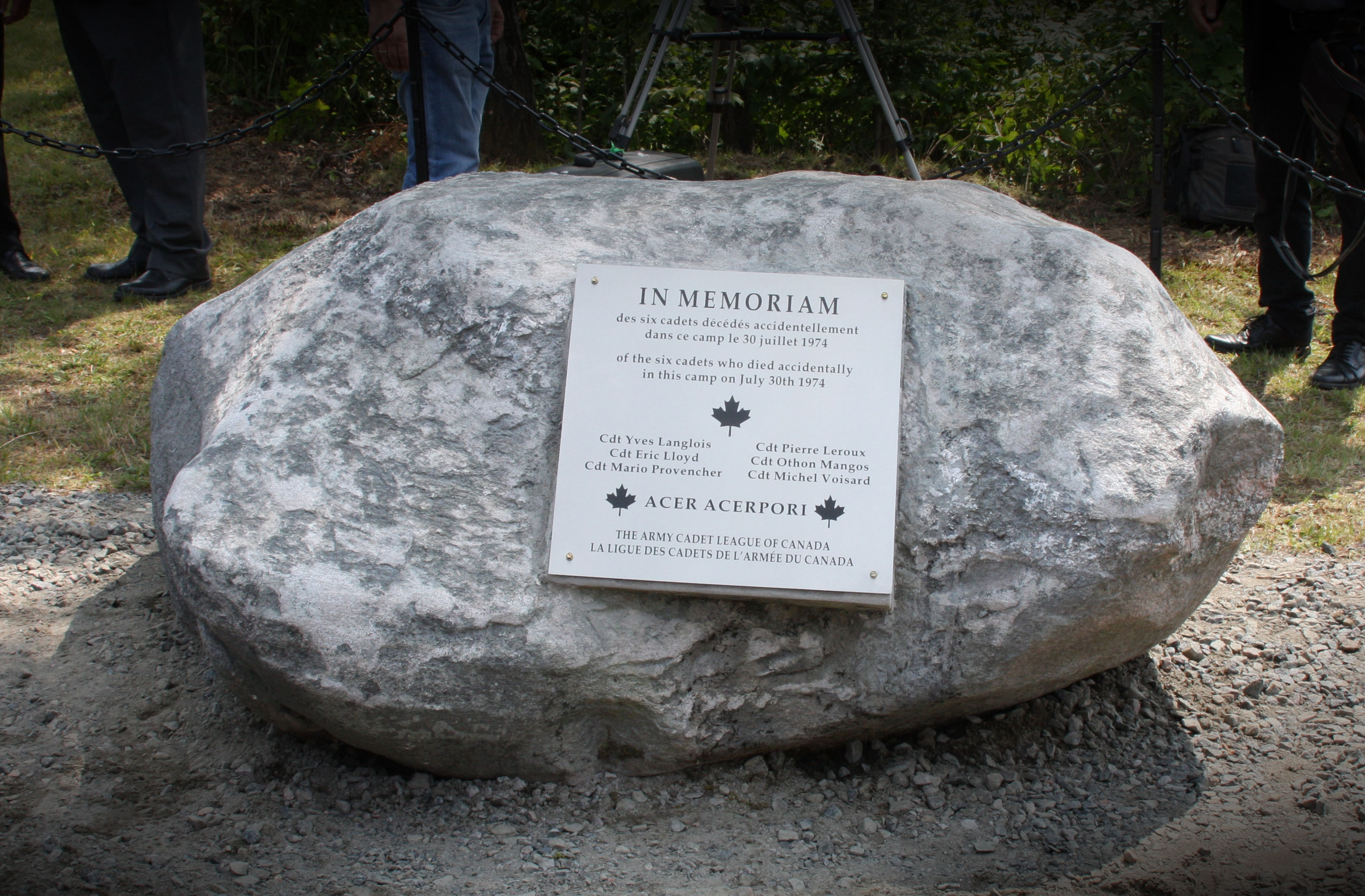
A memorial rock where a plaque names the cadets who died in the 1974 explosion. [Sharon Adams]
Eight former army cadets involved in a grenade accident 44 years ago have not yet come forward to apply for financial compensation and health-care support under the 1974 Valcartier Grenade Incident Program.
“We want to locate them as soon as possible, because the offer of compensation and health care expires in 2019,” said Gerry Fostaty, who was 18 at the time and a platoon sergeant who suffered post-traumatic stress disorder after providing first aid to victims and helping to identify bodies.
The former cadets sought are Ian Ross Anderson, Jacques Demers, Jean Guy Hache, Sven Engels, Jean Huot, Michel Parizeau, Pierre Trudel and Andre Vaillancourt.
In the incident, a cadet pulled the pin of a live grenade accidentally mixed in with inert demonstration grenades during a safety lecture at a cadet summer camp at CFB Valcartier in 1974. Six cadets died and scores were injured.
For four decades, cadets and their families bore the burden of physical and mental injuries with little support. Following social media reports of compensation for military responders, 52 complaints were filed by former cadets who were not eligible for the same care and benefits because they were neither military members nor civilian employees.
The military ombudsman investigated and concluded in 2016 that cadets had been treated callously during the investigation of the incident and unfairly afterward.
About 155 cadets in the room at the time of the explosion and non-professional first-aid responders are eligible for the compensation program announced in 2017 by Defence Minister Harjit Sajjan.
Each cadet in the room at the time of the explosion is eligible for $42,000 and estates of cadets who died are eligible for an additional $58,000. More seriously injured cadets may apply for an individual benevolent payment to bring their financial award to a maximum of $310,000. The Department of National Defence and the Canadian Armed Forces will pay related health-care costs not funded by provincial health-care systems for the lifetime of injured former cadets.
“This is way bigger than just the 1974 cadets,” said Randy Brooks, who was left with PTSD and permanent physical disabilities from the blast. “How we’re treated and what we get as compensation will have an impact on all future cadets.”
Brooks bitterly recalled his treatment in 1974: seriously injured, fresh from surgery and in a wheelchair, he was subject to a military interrogation at age 14 without a parent or advocate present and was told if he talked about the incident, he could be jailed and suffer financial penalties, he said.
Stress took a terrible toll on his family, said Brooks, as he struggled with medical difficulties and his parents fought for support and financial compensation. He blames that stress for the premature birth of a sister, the early deaths of both parents and for damaging his relationship with a sister who was frightened by his convulsions and nightmares. “She thought I had turned into a demon,” he said. His medical condition continues to affect his spouse and two daughters.
The poor support of the Valcartier cadets uncovered by the ombudsman’s investigation sparked a second investigation into compensation and support for all ill and injured cadets. Ombudsman Gary Walbourne reported in 2017 that Canada’s 50,000 army, air and sea cadets are not treated on par with military and civilian employees involved in the cadet program. He recommended cadets receive similar compensation and support and that policies and procedures be developed for providing it.
Cadets suffering illness or injury during approved activities are entitled to the same level of medical care as a short-term reserve force private, Sajjan said in his response to the report. The CAF is reviewing the ombudsman’s recommendations in consultation with cadet organizations to “determine the best way forward in supporting the cadets who become ill or injured while participating in the cadet program,” he said.
The deadline to apply for compensation is March 9, 2019, and the program ends March 9, 2020. Further information about the compensation program is available at 1974@forces.gc.ca or by calling 844-800-8566. Former cadets can connect online at www.facebook.com/groups/37200092808/.
Advertisement



















